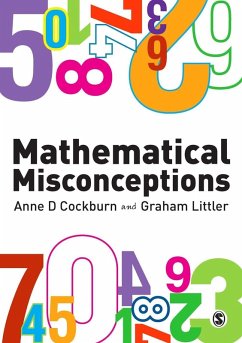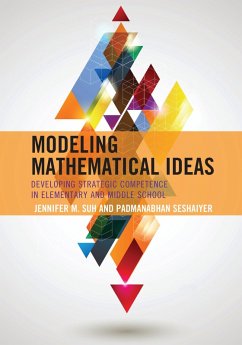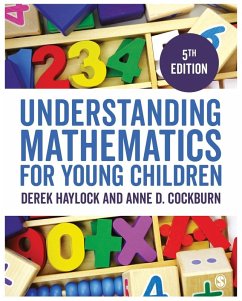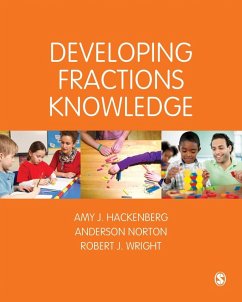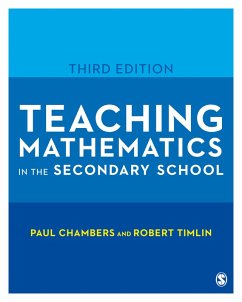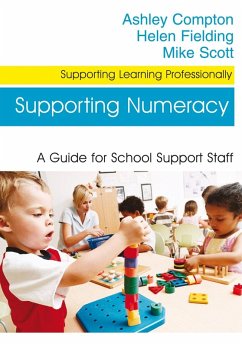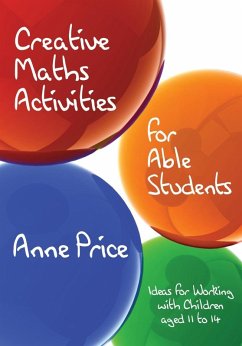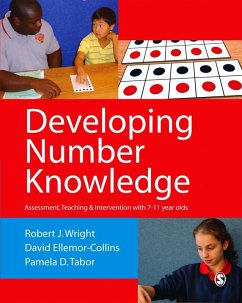
Mathematical Understanding 5-11 (eBook, PDF)
A Practical Guide to Creative Communication in Maths
Redaktion: Cockburn, Anne
Versandkostenfrei!
Sofort per Download lieferbar
37,95 €
inkl. MwSt.
Weitere Ausgaben:

PAYBACK Punkte
19 °P sammeln!
Sam - a young and enthusiastic trainee teacher - asked the class, 'What is the difference between 7 and 6?'. Jo's hand shot up and he immediately responded, 'Well seven is all straight lines and sixes are all curly.'How can you help children to make progress in mathematical understanding?Children's mathematical misconceptions very often arise as a result of poor communication. This practical and innovative book presents a range of creative strategies to help teachers communicate effectively in the mathematics classroom, offering some new ways of presenting the fundamental concepts and principl...
Sam - a young and enthusiastic trainee teacher - asked the class, 'What is the difference between 7 and 6?'. Jo's hand shot up and he immediately responded, 'Well seven is all straight lines and sixes are all curly.'
How can you help children to make progress in mathematical understanding?
Children's mathematical misconceptions very often arise as a result of poor communication. This practical and innovative book presents a range of creative strategies to help teachers communicate effectively in the mathematics classroom, offering some new ways of presenting the fundamental concepts and principles of mathematics, and clearly demonstrating that the most effective form of communication is not always verbal.
Each chapter focuses on a theme or concept central to the numeracy strategy, such as subtraction, shape and space, constructing and connecting 2D and 3D shapes, data-logging and graph interpretation, and mathematical reasoning. Each chapter supports teachers' subject knowledge as well as suggesting a range of communication strategies (e.g. speaking, listening, drawing, role play, and visual methods such as posters and ICT work) to help teachers and children to share and build on their understanding. All of the activities have been tried and tested in classrooms across Europe.
Written by a team of highly experienced teachers, the book will be valuable reading for pre- and in-service teachers, teacher educators and anyone who has an interest in extending the ways children actively engage with mathematics. Teachers with EAL pupils in their class may find it of particular value in communicating mathematical concepts to those who find English difficult.
The book is accompanied by a DVD which includes video clips of children at work in mathematics classrooms, software used in the project, copies of material from the book and additional activities.
How can you help children to make progress in mathematical understanding?
Children's mathematical misconceptions very often arise as a result of poor communication. This practical and innovative book presents a range of creative strategies to help teachers communicate effectively in the mathematics classroom, offering some new ways of presenting the fundamental concepts and principles of mathematics, and clearly demonstrating that the most effective form of communication is not always verbal.
Each chapter focuses on a theme or concept central to the numeracy strategy, such as subtraction, shape and space, constructing and connecting 2D and 3D shapes, data-logging and graph interpretation, and mathematical reasoning. Each chapter supports teachers' subject knowledge as well as suggesting a range of communication strategies (e.g. speaking, listening, drawing, role play, and visual methods such as posters and ICT work) to help teachers and children to share and build on their understanding. All of the activities have been tried and tested in classrooms across Europe.
Written by a team of highly experienced teachers, the book will be valuable reading for pre- and in-service teachers, teacher educators and anyone who has an interest in extending the ways children actively engage with mathematics. Teachers with EAL pupils in their class may find it of particular value in communicating mathematical concepts to those who find English difficult.
The book is accompanied by a DVD which includes video clips of children at work in mathematics classrooms, software used in the project, copies of material from the book and additional activities.
Dieser Download kann aus rechtlichen Gründen nur mit Rechnungsadresse in A, D ausgeliefert werden.




